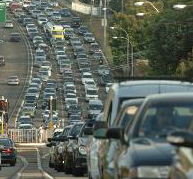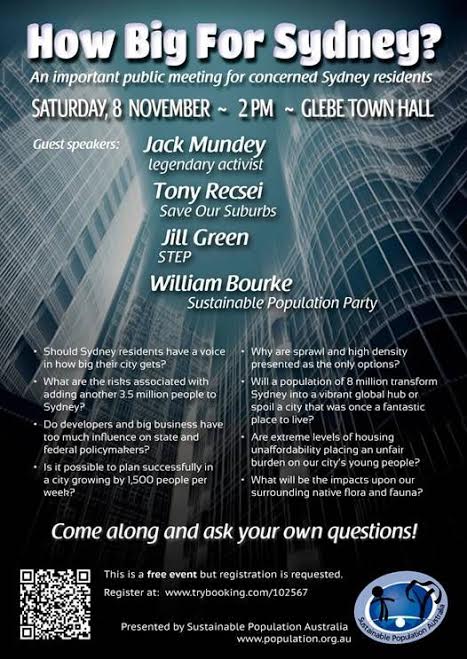Keeping the Greater Sydney Commission honest about population and density
 The following article publishes an email sent by Tony Recsei, President of Save our Suburbs NSW, to SOS members and friends. Dated Thursday, 26 May 2016, it is a report on his attendance at a luncheon organised by the Greater Sydney Commission (GSC) in Paramatta. The GSC is a growth lobby tool. Here Recsei points out that the 30 minute city does not exist as planners describe it and suggests that the Commission should investigate low density cities where the cost of housing is also low and find out what they are doing right, instead of continuing to visit high density cities. See the SOS NSW blogspot here.
The following article publishes an email sent by Tony Recsei, President of Save our Suburbs NSW, to SOS members and friends. Dated Thursday, 26 May 2016, it is a report on his attendance at a luncheon organised by the Greater Sydney Commission (GSC) in Paramatta. The GSC is a growth lobby tool. Here Recsei points out that the 30 minute city does not exist as planners describe it and suggests that the Commission should investigate low density cities where the cost of housing is also low and find out what they are doing right, instead of continuing to visit high density cities. See the SOS NSW blogspot here.
Yesterday I attended a luncheon organized by the Greater Sydney Commission (GSC) at their offices in Parramatta. The GSC was formed to lead metropolitan planning for the Greater Sydney Region. Twelve people attended the luncheon, half of them being members of the GSC including chairperson Lucy Turnbull and chief executive officer Sarah Hill. The rest were from various government and non-government organisations.
A pleasant atmosphere prevailed and people talked freely. GSC Social Commissioner Heather Nesbitt introduced the discussion, emphasizing the need for livability and collaboration and trust. Sarah Hill said priorities include preparing district plans, getting out of the office and talking to people. There needs to be plans for a greater Parramatta, the Western Sydney Airport, linking infrastructure with planning, providing advice to the Minister and making awards and grants. Lucy Turnbull said they will try to get a whole of government approach.
In turn we were each invited to say what we felt.
I said:
· Save Our Suburbs focusses on the underlying rationale behind planning in the state. That rationale relates to increasing density. A fundamental tension results as the community does not want increased density. This dichotomy bedevils all attempts at consultation.
· Neither high-profile high-density advocate Professor Peter Newman nor anyone else can give me an example of a high-density city that does not suffer from the ills they claim high-density will alleviate.
· A previous planning minister, Brad Hazard had led a delegation to investigate planning in North America but only visited jurisdictions with high-density policies. They did not visit the more successful cities which happen to have low density policies.
· No advantages claimed for high-density policies stand up to any scrutiny. These policies cause increased congestion, unaffordable housing and adverse health impacts (such as a 70% increase in psychosis). Forcing in high-density when most people want single-residential reduces housing choice. High-density results in excessive greenhouse gas emissions. In high-rise per person energy consumption and embodied energy is double that of single-residential. Such emissions represent 30% of people’s annual emissions while transport represents only 10%.
Lucy Turnbull referred to the “30 minute city” - that is a city divided into sections where people in 30 minutes or less can easily get to work, shops, schools etc. and walk to many destinations. I asked where is such a place. People might initially find a dwelling near their place of work but subsequently change their job without moving house; other members of the household may work or study somewhere else. I pointed such reduction in travel times does not happen in high-density cities. For example Hong Kong has average travel times to work of 47 minutes compared to 35 minutes in Sydney. Also, in Hong Kong only about 20% of people work in the area where they live. This proportion is about the same as in low density Los Angeles. A city with “30 minute” sections is a figment of the imagination.
They asked what North American cities should Brad Hazard have visited. I suggested Houston as an example where houses cost about ¼ of their equivalents in Sydney and suggested the GSC should send a delegation there to see what Houston does right and what it does wrong.
My discussion took about 30 minutes of the 2 hour luncheon time.
As we left one of the GSC members said to me “Keep on keeping us honest”!



Recent comments